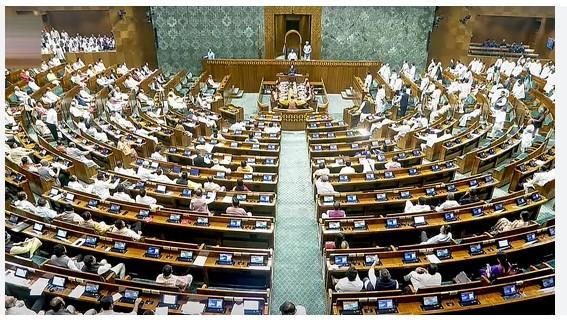Nearly 47 per cent of ministers in the country have declared criminal cases against themselves, including serious charges such as murder, kidnapping, and crimes against women, according to an analysis of poll rights body Association for Democratic Reforms (ADR).
The report came days after the Centre introduced three bills that sought the removal of prime minister, chief ministers, and ministers arrested for 30 days on serious criminal charges.
ADR examined self-sworn affidavits of 643 ministers from 27 state assemblies, three Union Territories and the Union Council of Ministers, and found that 302 ministers, or 47 per cent of the total, have criminal cases against them.
Of these 302 ministers, 174 face serious criminal cases, the report stated.
According to the analysis, of 336 BJP ministers, 136 (40 per cent) declared criminal cases against themselves, and 88 (26 per cent) are facing serious charges.
The Congress, which is in power in four states, had 45 ministers (74 per cent) with criminal cases, including 18 (30 per cent) with serious offences.
Of 31 DMK ministers, 27 — accounting for around 87 per cent — face criminal charges, while 14 (45 per cent) face serious cases. The Trinamool Congress too had 13 of its 40 ministers (33 per cent) with criminal cases, including 8 (20 per cent) with serious charges.
The Telugu Desam Party had the highest proportion, with 22 of its 23 ministers (96 per cent) declaring criminal cases and 13 (57 per cent) of them booked for serious offences. Among AAP ministers, 11 of 16 (69 per cent) face criminal cases, while five (31 per cent) are facing serious ones.
At the national level, 29 of the 72 Union ministers (40 per cent) declared criminal cases in their affidavits.
In the states, 11 assemblies — Andhra Pradesh, Tamil Nadu, Bihar, Odisha, Maharashtra, Karnataka, Punjab, Telangana, Himachal Pradesh, Delhi and Puducherry — have more than 60 per cent of ministers with criminal cases.
In contrast, ministers in Haryana, Jammu and Kashmir, Nagaland and Uttarakhand reported no criminal cases against themselves.
ADR has also come up with an analysis of the financial assets of ministers in the report. According to it, the average assets of ministers stood at Rs 37.21 crore, with the total assets of all 643 ministers amounting to Rs 23,929 crore.
Out of the 30 Assemblies, 11 have billionaire ministers. Karnataka leads with the highest eight billionaire ministers, followed by Andhra Pradesh with six and Maharashtra with four such ministers.
Arunachal Pradesh, Delhi, Haryana and Telangana have two each, while Gujarat, Himachal Pradesh, Madhya Pradesh and Punjab have one billionaire minister each.
At the Union government, six of the 72 Union Council ministers (eight per cent) were billionaires, the report said.
Party-wise, the BJP had the highest number of billionaire ministers at 14, though this constituted just 4 per cent of its total. The Congress ranked second, with 11 of its 61 ministers (18 per cent) being billionaires, while the TDP had 6 billionaire ministers among its 23 (26 per cent).
The Aam Aadmi Party, Janasena Party, JD(S), NCP and Shiv Sena also have billionaire ministers.
The richest minister in the country is Dr Chandra Sekhar Pemmasani of the TDP, who represents Andhra Pradesh’s Guntur in the Lok Sabha. He has declared assets worth over Rs 5,705 crore.
Karnataka Congress leader and state minister D K Shivakumar follows next, with assets exceeding Rs 1,413 crore, while Andhra Pradesh Chief Minister N Chandrababu Naidu, who helms the TDP, has assets worth over Rs 931 crore.
Other rich ministers in the top 10 include Narayana Ponguru and Nara Lokesh from Andhra Pradesh, Gaddam Vivekanand and Ponguleti Srinivasa Reddy from Telangana, Suresha B S from Karnataka, Mangal Prabhat Lodha from Maharashtra, and Union Minister Jyotiraditya Scindia.
At the other end of the spectrum, a handful of ministers reported very modest wealth. Sukla Charan Noatia of the Indigenous Peoples Front of Tripura declared assets worth just Rs 2 lakh, while West Bengal minister Birbaha Hansda of the Trinamool Congress reported assets of a little over Rs 3 lakh.
ADR noted that the status of the criminal cases cited in the affidavits may have changed since they were filed with the Election Commission during polls between 2020 and 2025.


